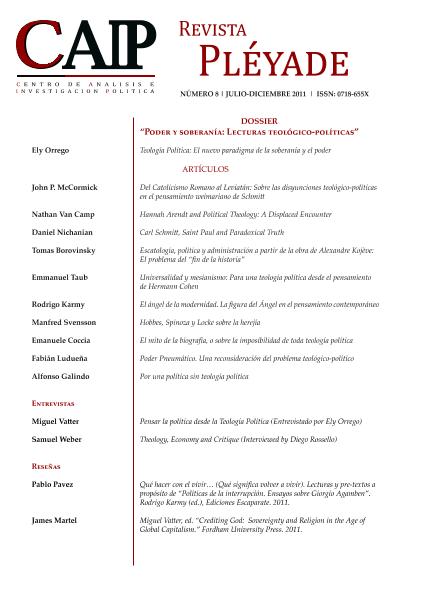Mostrar el registro sencillo del ítem
dc.contributor.author
Borovinsky, Tomás Guido

dc.date.available
2023-04-17T13:03:27Z
dc.date.issued
2011-12
dc.identifier.citation
Borovinsky, Tomás Guido; Escatología, política y administración a partir de la obra de Alexandre Kojève: El problema del “fin de la historia”; Centro de Análisis e Investigación Política; Pléyade; 8; 12-2011; 63-83
dc.identifier.issn
0718-655X
dc.identifier.uri
http://hdl.handle.net/11336/194094
dc.description.abstract
El presente trabajo de investigación se propone indagar las matrices teológicas que subyacen a los debates en torno al fin de la historia –y al fin de la política–, ahondando también en los fundamentos teológicos del triunfo de la economía y la administración por sobre la política en la escena contemporánea. Considerando esto, la obra de Alexandre Kojève es más que relevante para revisitar la relación fundamental entre teología y política que marca, quizás sombríamente, el pensamiento moderno. En este sentido, el texto tiene en consideración las marcas escatológicas en un trabajo herético como es el de Alexandre Kojève (un pensador al que autores como Giorgio Agamben tanto deben). Porque si, como señala el autor, la historia ha llegado a su fin –noción que Francis Fukuyama popularizará más tarde– entonces lo único que queda por hacer es administrar económicamente lo existente.
dc.description.abstract
The aim of this article is to explore the theological matrices underlying the debates about the end of history –and the end of politics– also looking in depth at the theological fundamentals of the triumph of economics and administration over politics in the contemporary scene. Regarding this, Alexandre Kojève’s work has been more than relevant in order to revisit that fundamental relation between theology and politics, which influences, even if only in the shasdows, modern thought. In this sense, this article takes into account the eschatological imprints in such an heretic work as the one from Alexandre Kojève (an author to whom Giorgio Agamben owes more than he is willing to accept). Because if, as the former points out, history has reached its end –a notion that Francis Fukuyama later popularized– then the only thing left to do is the economical administration of the existing.
dc.format
application/pdf
dc.language.iso
spa
dc.publisher
Centro de Análisis e Investigación Política
dc.rights
info:eu-repo/semantics/openAccess
dc.rights.uri
https://creativecommons.org/licenses/by-nc/2.5/ar/
dc.subject
KOJÈVE
dc.subject
GOBIERNO
dc.subject
ADMINISTRACIÓN
dc.subject
ESCATOLOGÍA
dc.subject.classification
Otras Ciencia Política

dc.subject.classification
Ciencia Política

dc.subject.classification
CIENCIAS SOCIALES

dc.title
Escatología, política y administración a partir de la obra de Alexandre Kojève: El problema del “fin de la historia”
dc.title
Eschatology, politics and administration in the framework of Alexandre Kojève’s work: The problem of “the end of history”
dc.type
info:eu-repo/semantics/article
dc.type
info:ar-repo/semantics/artículo
dc.type
info:eu-repo/semantics/publishedVersion
dc.date.updated
2023-04-14T15:58:44Z
dc.identifier.eissn
0719-3696
dc.journal.number
8
dc.journal.pagination
63-83
dc.journal.pais
Chile

dc.journal.ciudad
Santiago de Chile
dc.description.fil
Fil: Borovinsky, Tomás Guido. Consejo Nacional de Investigaciones Científicas y Técnicas; Argentina. Universidad de Buenos Aires. Facultad de Ciencias Sociales. Instituto de Investigaciones "Gino Germani"; Argentina. Universidad Nacional de Tres de Febrero. Centro de Estudios sobre Genocidio; Argentina
dc.journal.title
Pléyade
dc.relation.alternativeid
info:eu-repo/semantics/altIdentifier/url/https://dialnet.unirioja.es/servlet/articulo?codigo=3978709
dc.relation.alternativeid
info:eu-repo/semantics/altIdentifier/url/https://www.revistapleyade.cl/index.php/OJS/article/view/225
Archivos asociados
